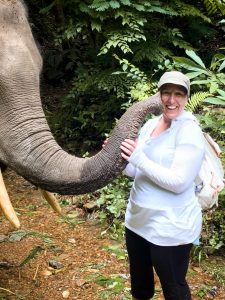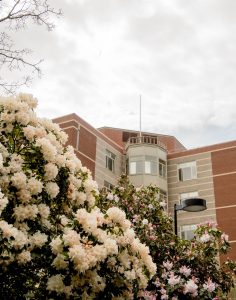The following article contains excerpts from a March 14 interview. Initials indicate the speaker.

Meet Monica J. Casper, Seattle University’s new and highly anticipated dean for the College of Arts and Sciences (CAS). Casper has previously worked for many universities including San Diego State University, The University of Arizona and Vanderbilt University. The Spectator had the opportunity to talk with Casper and learn about what she plans to bring to Seattle U.
CS: Tell me a little bit about yourself.
MJC: I’m from Chicago originally. I grew up in the Midwest and have lived in a number of different places. I was a [first-generation college] student at the University of Chicago, and a lot of that experience shaped how I approach my [role]… I have two young adult daughters who are 20 and 22 years old. My kids were both born in the Seattle area [and] we used to live on Whidbey Island. It’s really nice to think about coming back, I’m excited about that. I’m a gardener, a jazz fan and a creative writer. I do a lot of creative writing and publishing.
CS: Why did you choose education as a career path? What do you enjoy about teaching?
MJC: I worked for two years [after undergrad] before I decided to come to graduate school, and I picked a program at UC San Francisco that specialized in women’s health because that was my interest, and I almost have never looked back… I [went into education] because I was interested in women’s health. I didn’t start because I wanted to be a teacher, per se. I think that that happens with a lot of scholars [who] were drawn to the research side. But I discovered that I actually love teaching… being able to influence people and give people the skills to move forward in their lives, that’s been huge.
CS: What made you want to work for Seattle University?
MJC: I enjoy my current role at [San Diego State University]. I’m working on gender-based violence issues with the president. But I [also] love being a dean and… being back in [Seattle] is really appealing to me. I love what Seattle University is doing with its strategic plan and trying to be the most progressive Jesuit University. That’s exciting to me, I [like the] opportunity to develop some programs that don’t exist there, including maybe bioethics, which is an area that I work in.
CS: You mentioned potentially developing a bioethics program at Seattle University. Is there anything else you want to implement in your new position?
MJC: The way I work [is] very collaborative. [I would like to spend] this first year getting to know the campus, faculty and students. [We could potentially do something] connected to bioethics. I’m really interested in medical and environmental humanities. So really thinking about those things as a humanistic object of interest that also includes performing in creative arts. Thinking about creative ways to respond to sustainability issues or the climate crisis that are interdisciplinary would be really powerful.
CS: Your current position at San Diego State University has helped combat gender-based violence on campus. What does this role entail?
MJC: I [am the] dean of the College of Arts and Letters, which is kind of the closest thing to [the College of Arts and Sciences], and we had a pretty public off-campus sexual assault of a young woman in the community by some of our athletes. It created a lot of upset on campus. The president and I had already been talking about ways to do something that wasn’t just about compliance with Title IX, or federal guidelines, but [something] really transformational. I think most campuses haven’t thought about it in [ways such as]… sharing the task force, working with others on campus to think about what would look different, what can we do that changes our practices from a culture of compliance to a culture of care.I am a bit sad about leaving that role, but again, [this problem is] industry-wide. It’s the kind of thing that I could certainly bring with me and continue to implement [at Seattle U].

CS: What is something that you’ve learned from your previous positions that you hope to take with you to Seattle University?
MJC: I came up into administration through running schools and [by] becoming an associate dean for faculty affairs and diversity. So I have a lot of work in the social justice anti-racist space. [I also think it’s valuable] to know how to keep faculty not even happy, but how to support faculty so they can do the work they need to do… And so that world really taught me a lot about how to create a humane workplace for faculty and staff.
CS: You have co-written eight books in your career. Can you tell me a little bit about some of the books you’ve written?
MJC: My first book was called “The Making of the Unborn Patient.” It was based on my dissertation which looked at the fetus as a patient in relation to the pregnant person, and that book won some awards. I’ve written on environmental health, the body and the ways that our bodies are shaped by our social contacts in all sorts of ways. The last book that I wrote came out in 2022 and that was a book that looked at the problem of infant mortality and racism in the United States, including why we don’t seem to pay much attention to that problem.
CS: You mentioned that you have a lot of work in the social justice space. How do you plan to advance anti-racist practices at Seattle University?
MJC: I’ve always had a strong sense of justice and I am committed to creating what I keep calling a culture of care. I would add inclusion to that. For me, it has to be more than lip service… it has to be built into the infrastructure. We have to bake it into the work that we’re doing. I’ll give you an example at San Diego State. All of the colleges have [Diversity, Equity, and Inclusion] plans. All of them have an assistant or associate dean managing those plans. So when I became dean, I said, ‘That’s not good enough.’ The dean [should] be in charge of that, this has to live at the level of the dean, because it’s important in the same way [it is] that the gender-based violence work lives at the level of the president now at San Diego State.
CS: What is a fun fact you want the Seattle University community to know about you?
MJC: I love elephants. I have a collection of probably about 130 elephant memorabilia. For a long time I taught a graduate [level] critical trauma studies class, and I would teach a section on elephant trauma [and] animal trauma, and elephants became what I call the poster child for human and trauma… I still am really interested in elephants as a beacon of species loss and the ways that we should be thinking about our world differently. So I started noticing elephants wherever I went, and then I just started collecting them, and then people would give them to me. And now I have a lot of elephants. My kids say, “You can have too many elephants,” and I say “You can never have too many elephants!”
CS: Lastly, do you have a general message for the greater Seattle University community?
MJC: My general message [is] my door is always open. Let’s work together, I believe in collaboration. I’m coming not to lead, but to lead with… I think that it’s important to remember that what we’re doing isn’t always serious, isn’t always hard. We should find pleasure and joy in the work that we’re doing, and we should do that together. I think there’s something about building community that lets us do that. I’m excited!
Casper will join Seattle U Aug. 1. Her hiring concludes a months-long process of searching for a replacement for David Powers, who has served as the CAS dean for 15 years.








